Between farming, fishing and tourism, the people of Malin in Donegal are hoping for a good outcome on Brexit. This area of the Inishowen peninsula has seen its fair share of changes over the years, as a visit to the Doagh Famine Village will show.
Today, Failte Ireland and Tourism Ireland market Malin Head as an iconic tourism attraction, as well as a Star Wars filming location with sightings of the Northern Lights (Aurora Borealis).
Despite all that, the locals say that farming is what keeps the tourists coming back. Tourists often stop to take pictures of the sheep in the green fields or of the thatched cottages, they do not want to visit an abandoned landscape, farmers say.
If there is a pound about, everybody gets a pound. It’s real money, real hardcore cash
“If you took one of the big corporations like Google out of Dublin, taking fishing or farming out of here would actually have a far bigger effect. The backbone of any country is the self-employed and those who work the soil,” says Eddie Kelly, manager of Malin Head Fisherman’s Co-Op.
“If you come down here tomorrow morning and all the boats are out of the harbour, come the evening time there is €30,000 to €50,000 worth of crab. That’s real money, that money wasn’t in this country six or seven hours ago.
“There’s 50 or 60 people over in the factory waiting on it, the lorry man and everyone has their pound in their pocket. If there is a pound about, everybody gets a pound. It’s real money, real hardcore cash.”
I can remember, a small farmer would be self-sufficient. He cut turf, kept a cow or two. He grew spuds, cabbage and turnip
If that business was taken away from the area, he says there would be mass emigration. Some of the boats that land at Malin Head Fisherman’s Co-Op are registered in the UK and there is a fear that they would no longer be allowed to do that in a no-deal Brexit scenario. UK-registered vehicles can fish inside the Irish six-mile limit.
“Years ago, I can remember, a small farmer would be self-sufficient. He cut turf, kept a cow or two. He grew spuds, cabbage and turnips.
"A lot of small farmers went in the summer time to fish the salmon and for the first time in the year they had cash in the hand.
“They paid the wholesaler for meal, shoes for the wee-uns going back to school. That was the cash injection for the year,” Eddie reminisces.
Border
Many people you talk to in the area remember a time when there was border checks where Donegal meets Northern Ireland. The free travel area is essential for the whole county of Donegal, as the north opens up links to the rest of the country.
If not, a truckload of sheep or pigs from Malin would have to travel down to Bundoran to avoid crossing a UK border, in its trip to factories in the rest of the Republic.
Changing times
John McColgan is a retired post office master and part-time farmer
John showed Irish Country Living Scoil Cholmcille in Glengad, which is celebrating its 50-year anniversary.
“When I attended, there were 160 kids there. There’s only half now, about 90. The old school had no central heating, big high windows, no running water. There were toilets but no running water. The parish priest at the time, Fr McKenna, was new and one of the first things he did was commission a new school.

Farmer John McColgan was among some of the first pupils at Scoil Cholmcille in Glengad when it first opened 50 years ago. \ Odile Evans
“Different wee businesses are keeping the thing going now, really and truly they are all down to that parish priest. He was the instigator in getting the factories to Malin Head. There was Fruit of the Loom, which is now Forward Emphasis call centre.
“We have good employers in the area, just not enough of them. The population has very badly decreased. In my day there was nothing but emigration. I can’t understand why a big company has to go into Dublin instead of rural areas.
“You wouldn’t get a better area than this for people to pull together.”
Focus: future of farming in Malin
David Doherty
Cattle and potatoes

David Doherty (back) with Ultan, Oran and Shane Doherty at Ballynahona, Co Donegal. \ Odile Evans
“A lot of the farmers are living on a margin, and most of the time it’s just covering costs. You pay a bill and another one comes around. I think the Government and Department let seed potato growers down a wee bit. It costs too much to produce them and keep them virus free.
“I think consumers are in the dark about a lot of things that happen in the potato industry. Cold stores around the country can be filled with top-quality potatoes, while big supermarkets are buying off big commercial units in England. There are trucks over and back all the time. It’ll shut down the smaller boys here.”
Tommy Mullins,
Sheep and sucklers
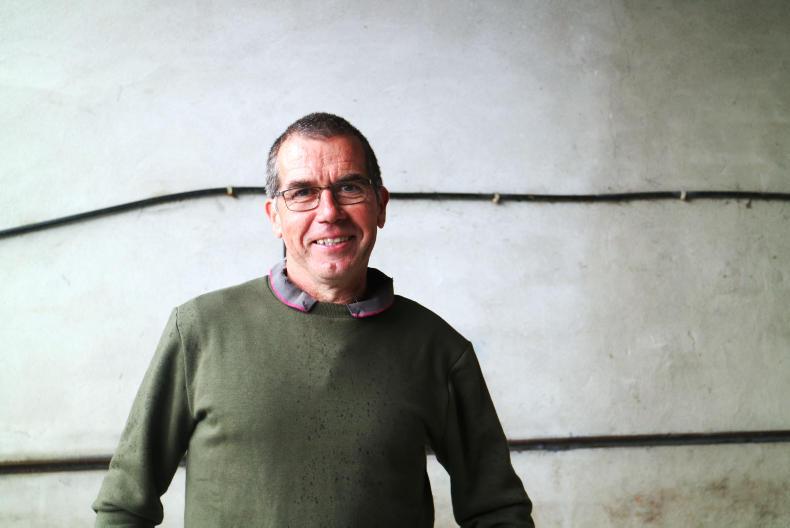
Tommy Mullins is the chair of the Inishowen farmers co-op. \ Odile Evans
“I’m in both BDGP and BEAM. I think the BEAM scheme is a disgrace for the people that made it. I’m finishing my heifers and bullocks at 20 to 22 months. I can’t improve much on that unless I cut back my cows. It would appear to me that they are using the beef farmer to subsidise the dairy farmer.
“I think it’s ludicrous that the factory bosses can run this country and not pay tax. The competition authority should be moving in on the supermarkets and factories.
“I have three sons interested in farming and they are all away working. Any one of the three of them would come home farming in the morning and I have plenty of work for them. But they won’t have a wage.
“I think the education system is all wrong because everybody who does the Leaving Cert is expected to go to third-level education. There is a lot of work there for people who don’t go to third level, it’s expensive and a lot of them aren’t going to make use of it.”
Tommy McLoughlin
Sucklers and sheep
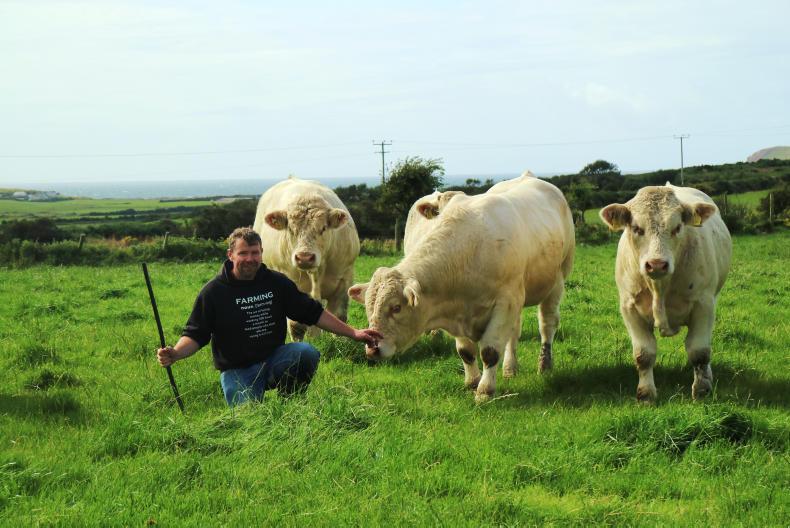
Tommy McLoughlin with his pedigree Charolais bulls at Sheskin, Malin Head, Co Donegal. \ Odile Evans
“As regards the future of farming, it’s very bleak. I would have bought all this land, built it up from nothing to approximately 70 cows and 100 ewes. As far as I see it, the Government has totally forgotten about rural Ireland.
“If you are in the forgotten farmer category, you can’t even expect a big present at Christmas. The Government wants armchair farmers. I’m a full-time plumber. You get up at 5am and come home at night and work until 12am. Young farmers are dying, I’ve a son and he’s mad to farm. The farm will keep itself, it won’t keep a home going.
“Until the beef plan movement came along there was absolutely nobody looking to support the suckler farmer. IFA was a waste of time, I was on the local committee for four years and they did nothing.
“If they would keep their payments in Brussels and give us a good beef price so the man that works gets paid for what he’s done. With the current price of beef I don’t see any outlook for the sucklers. They don’t understand how many people and companies that the little farmer is keeping going all around Ireland.”
John McGilloway
Farmer working on the Inishowen locally led agri-environment scheme

John McGilloway keeps Red Angus cattle and is involved in the Inishowen EIP scheme. \ Odile Evans
This scheme received almost €1m over five years. Some 35 farmers applied to take part in the project, which got underway in September this year.
“It’s probably more commercially focused than the Burren scheme for example. We are unashamedly saying it is about profitability of the farm. We want to farm for a profit and as a by-product we’ll deliver the environmental goods as well, use clovers and utilise all your farm.
“The vast majority of farmers do not use their uplands to maximum effect. Back in the 2000s when they were destocked, that was it, sheep were gone. It takes a lot of work to get these hefted flocks back.
“We are going to get special mapping done, test wind direction, average rainfall, soil type and underlying geology. I think a scheme like this is our only hope. We are re-introducing cattle to the uplands. We are looking at herbal leys and older grasses that are much more persistent and don’t need as much inputs [as perennial ryegrass].
“The next stage for us is to add value to the animal. I would see us trying to develop our own brand and create a PGI for Inishowen or Donegal. You have to add value, differentiate, you cannot compete at a commodity price. There’s no Kerrygold beef as such.
“I would imagine most of the farmers in Inishowen will see their entitlements increase with flattening over the next few years.”
Brendan McLoughlin
Pig farmer

Brendan McLoughlin in Ballygorman in Co Donegal believes he is the most northerly pig farmer in Ireland. \ Odile Evans
Brendan McLoughlin sends his pigs to McCarrens in Cavan. He was supplying northern processors but became wary of that when Brexit came about.
“I import the grain from the docks there in Derry,” says Brendan, Ireland’s most northerly pig farmer. “When I forward-buy, I sign a contract but every contract now says ‘subject to Brexit’. If they introduce a tariff going over the border that’s going to be on top [of the grain price]. If I enquire down south, you’re talking at least an extra €20/t to come up here.
“There’s going to be a cost implication, we can’t compete with southern farmers. I don’t see a bright future because we are too far north, out on a limb as such.”
If there are queues at the border he says there could be pigs sitting for an extra hour in transport. He added that he is not convinced border security will be savvy enough to stop the spread of African Swine Fever (ASF).
“How do we introduce security on the island of Ireland? It’s easier to police the whole country but how do you police 200-odd roads right around the six counties.”
Between farming, fishing and tourism, the people of Malin in Donegal are hoping for a good outcome on Brexit. This area of the Inishowen peninsula has seen its fair share of changes over the years, as a visit to the Doagh Famine Village will show.
Today, Failte Ireland and Tourism Ireland market Malin Head as an iconic tourism attraction, as well as a Star Wars filming location with sightings of the Northern Lights (Aurora Borealis).
Despite all that, the locals say that farming is what keeps the tourists coming back. Tourists often stop to take pictures of the sheep in the green fields or of the thatched cottages, they do not want to visit an abandoned landscape, farmers say.
If there is a pound about, everybody gets a pound. It’s real money, real hardcore cash
“If you took one of the big corporations like Google out of Dublin, taking fishing or farming out of here would actually have a far bigger effect. The backbone of any country is the self-employed and those who work the soil,” says Eddie Kelly, manager of Malin Head Fisherman’s Co-Op.
“If you come down here tomorrow morning and all the boats are out of the harbour, come the evening time there is €30,000 to €50,000 worth of crab. That’s real money, that money wasn’t in this country six or seven hours ago.
“There’s 50 or 60 people over in the factory waiting on it, the lorry man and everyone has their pound in their pocket. If there is a pound about, everybody gets a pound. It’s real money, real hardcore cash.”
I can remember, a small farmer would be self-sufficient. He cut turf, kept a cow or two. He grew spuds, cabbage and turnip
If that business was taken away from the area, he says there would be mass emigration. Some of the boats that land at Malin Head Fisherman’s Co-Op are registered in the UK and there is a fear that they would no longer be allowed to do that in a no-deal Brexit scenario. UK-registered vehicles can fish inside the Irish six-mile limit.
“Years ago, I can remember, a small farmer would be self-sufficient. He cut turf, kept a cow or two. He grew spuds, cabbage and turnips.
"A lot of small farmers went in the summer time to fish the salmon and for the first time in the year they had cash in the hand.
“They paid the wholesaler for meal, shoes for the wee-uns going back to school. That was the cash injection for the year,” Eddie reminisces.
Border
Many people you talk to in the area remember a time when there was border checks where Donegal meets Northern Ireland. The free travel area is essential for the whole county of Donegal, as the north opens up links to the rest of the country.
If not, a truckload of sheep or pigs from Malin would have to travel down to Bundoran to avoid crossing a UK border, in its trip to factories in the rest of the Republic.
Changing times
John McColgan is a retired post office master and part-time farmer
John showed Irish Country Living Scoil Cholmcille in Glengad, which is celebrating its 50-year anniversary.
“When I attended, there were 160 kids there. There’s only half now, about 90. The old school had no central heating, big high windows, no running water. There were toilets but no running water. The parish priest at the time, Fr McKenna, was new and one of the first things he did was commission a new school.

Farmer John McColgan was among some of the first pupils at Scoil Cholmcille in Glengad when it first opened 50 years ago. \ Odile Evans
“Different wee businesses are keeping the thing going now, really and truly they are all down to that parish priest. He was the instigator in getting the factories to Malin Head. There was Fruit of the Loom, which is now Forward Emphasis call centre.
“We have good employers in the area, just not enough of them. The population has very badly decreased. In my day there was nothing but emigration. I can’t understand why a big company has to go into Dublin instead of rural areas.
“You wouldn’t get a better area than this for people to pull together.”
Focus: future of farming in Malin
David Doherty
Cattle and potatoes

David Doherty (back) with Ultan, Oran and Shane Doherty at Ballynahona, Co Donegal. \ Odile Evans
“A lot of the farmers are living on a margin, and most of the time it’s just covering costs. You pay a bill and another one comes around. I think the Government and Department let seed potato growers down a wee bit. It costs too much to produce them and keep them virus free.
“I think consumers are in the dark about a lot of things that happen in the potato industry. Cold stores around the country can be filled with top-quality potatoes, while big supermarkets are buying off big commercial units in England. There are trucks over and back all the time. It’ll shut down the smaller boys here.”
Tommy Mullins,
Sheep and sucklers

Tommy Mullins is the chair of the Inishowen farmers co-op. \ Odile Evans
“I’m in both BDGP and BEAM. I think the BEAM scheme is a disgrace for the people that made it. I’m finishing my heifers and bullocks at 20 to 22 months. I can’t improve much on that unless I cut back my cows. It would appear to me that they are using the beef farmer to subsidise the dairy farmer.
“I think it’s ludicrous that the factory bosses can run this country and not pay tax. The competition authority should be moving in on the supermarkets and factories.
“I have three sons interested in farming and they are all away working. Any one of the three of them would come home farming in the morning and I have plenty of work for them. But they won’t have a wage.
“I think the education system is all wrong because everybody who does the Leaving Cert is expected to go to third-level education. There is a lot of work there for people who don’t go to third level, it’s expensive and a lot of them aren’t going to make use of it.”
Tommy McLoughlin
Sucklers and sheep

Tommy McLoughlin with his pedigree Charolais bulls at Sheskin, Malin Head, Co Donegal. \ Odile Evans
“As regards the future of farming, it’s very bleak. I would have bought all this land, built it up from nothing to approximately 70 cows and 100 ewes. As far as I see it, the Government has totally forgotten about rural Ireland.
“If you are in the forgotten farmer category, you can’t even expect a big present at Christmas. The Government wants armchair farmers. I’m a full-time plumber. You get up at 5am and come home at night and work until 12am. Young farmers are dying, I’ve a son and he’s mad to farm. The farm will keep itself, it won’t keep a home going.
“Until the beef plan movement came along there was absolutely nobody looking to support the suckler farmer. IFA was a waste of time, I was on the local committee for four years and they did nothing.
“If they would keep their payments in Brussels and give us a good beef price so the man that works gets paid for what he’s done. With the current price of beef I don’t see any outlook for the sucklers. They don’t understand how many people and companies that the little farmer is keeping going all around Ireland.”
John McGilloway
Farmer working on the Inishowen locally led agri-environment scheme

John McGilloway keeps Red Angus cattle and is involved in the Inishowen EIP scheme. \ Odile Evans
This scheme received almost €1m over five years. Some 35 farmers applied to take part in the project, which got underway in September this year.
“It’s probably more commercially focused than the Burren scheme for example. We are unashamedly saying it is about profitability of the farm. We want to farm for a profit and as a by-product we’ll deliver the environmental goods as well, use clovers and utilise all your farm.
“The vast majority of farmers do not use their uplands to maximum effect. Back in the 2000s when they were destocked, that was it, sheep were gone. It takes a lot of work to get these hefted flocks back.
“We are going to get special mapping done, test wind direction, average rainfall, soil type and underlying geology. I think a scheme like this is our only hope. We are re-introducing cattle to the uplands. We are looking at herbal leys and older grasses that are much more persistent and don’t need as much inputs [as perennial ryegrass].
“The next stage for us is to add value to the animal. I would see us trying to develop our own brand and create a PGI for Inishowen or Donegal. You have to add value, differentiate, you cannot compete at a commodity price. There’s no Kerrygold beef as such.
“I would imagine most of the farmers in Inishowen will see their entitlements increase with flattening over the next few years.”
Brendan McLoughlin
Pig farmer

Brendan McLoughlin in Ballygorman in Co Donegal believes he is the most northerly pig farmer in Ireland. \ Odile Evans
Brendan McLoughlin sends his pigs to McCarrens in Cavan. He was supplying northern processors but became wary of that when Brexit came about.
“I import the grain from the docks there in Derry,” says Brendan, Ireland’s most northerly pig farmer. “When I forward-buy, I sign a contract but every contract now says ‘subject to Brexit’. If they introduce a tariff going over the border that’s going to be on top [of the grain price]. If I enquire down south, you’re talking at least an extra €20/t to come up here.
“There’s going to be a cost implication, we can’t compete with southern farmers. I don’t see a bright future because we are too far north, out on a limb as such.”
If there are queues at the border he says there could be pigs sitting for an extra hour in transport. He added that he is not convinced border security will be savvy enough to stop the spread of African Swine Fever (ASF).
“How do we introduce security on the island of Ireland? It’s easier to police the whole country but how do you police 200-odd roads right around the six counties.”









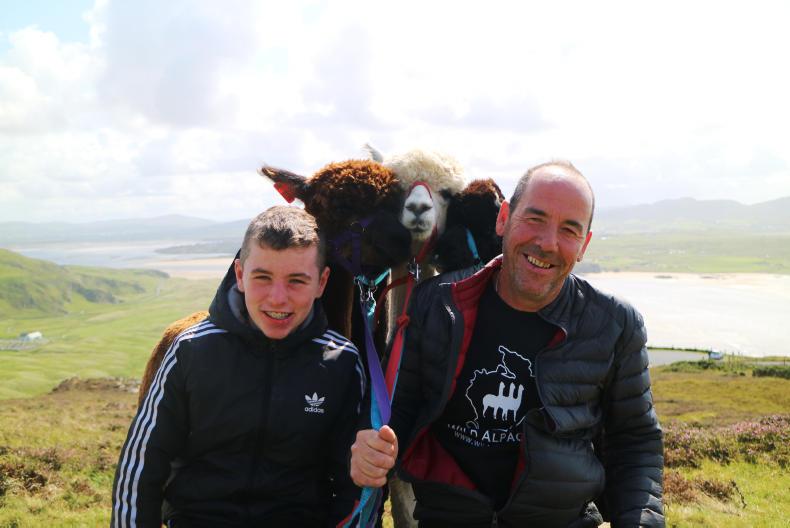

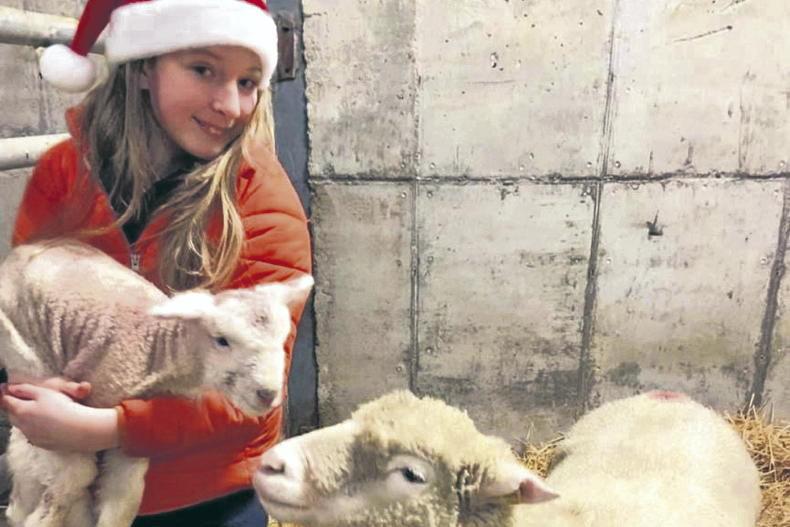
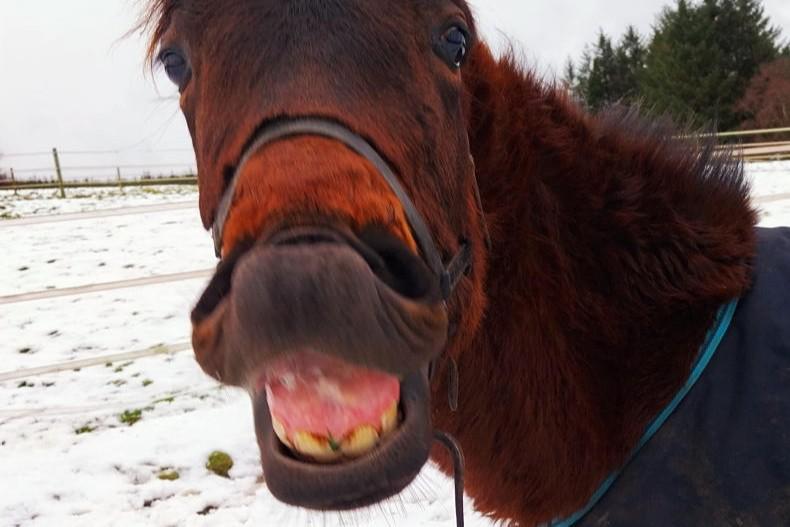
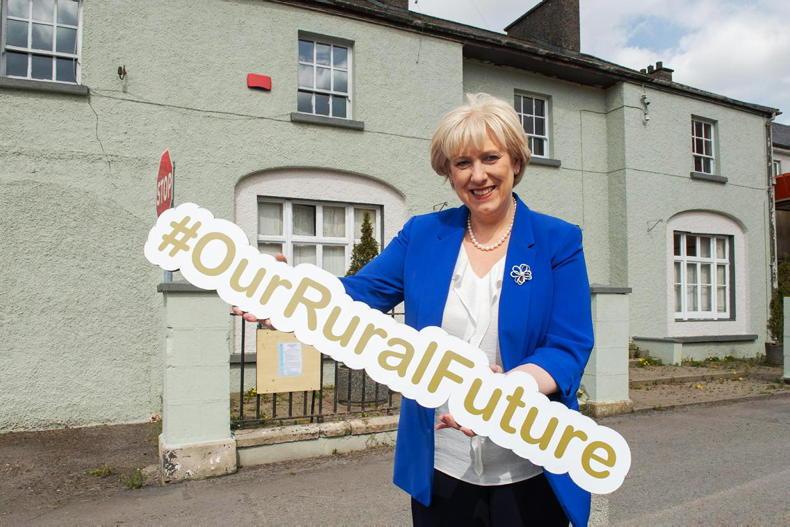
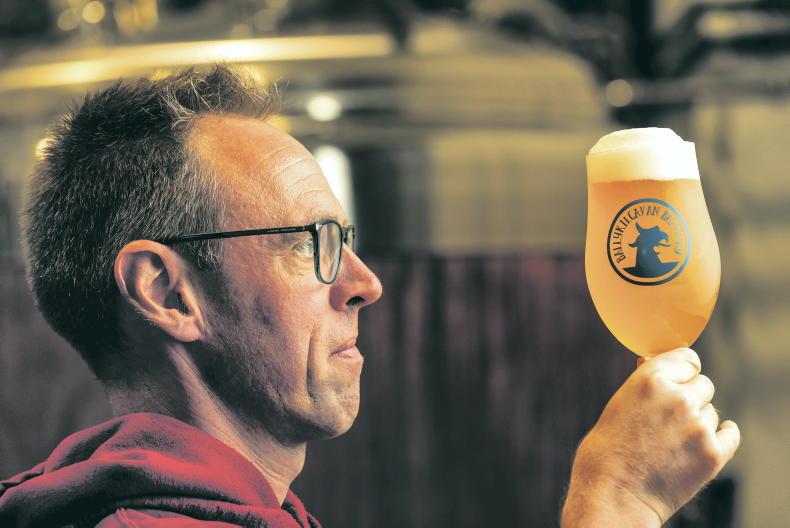
SHARING OPTIONS